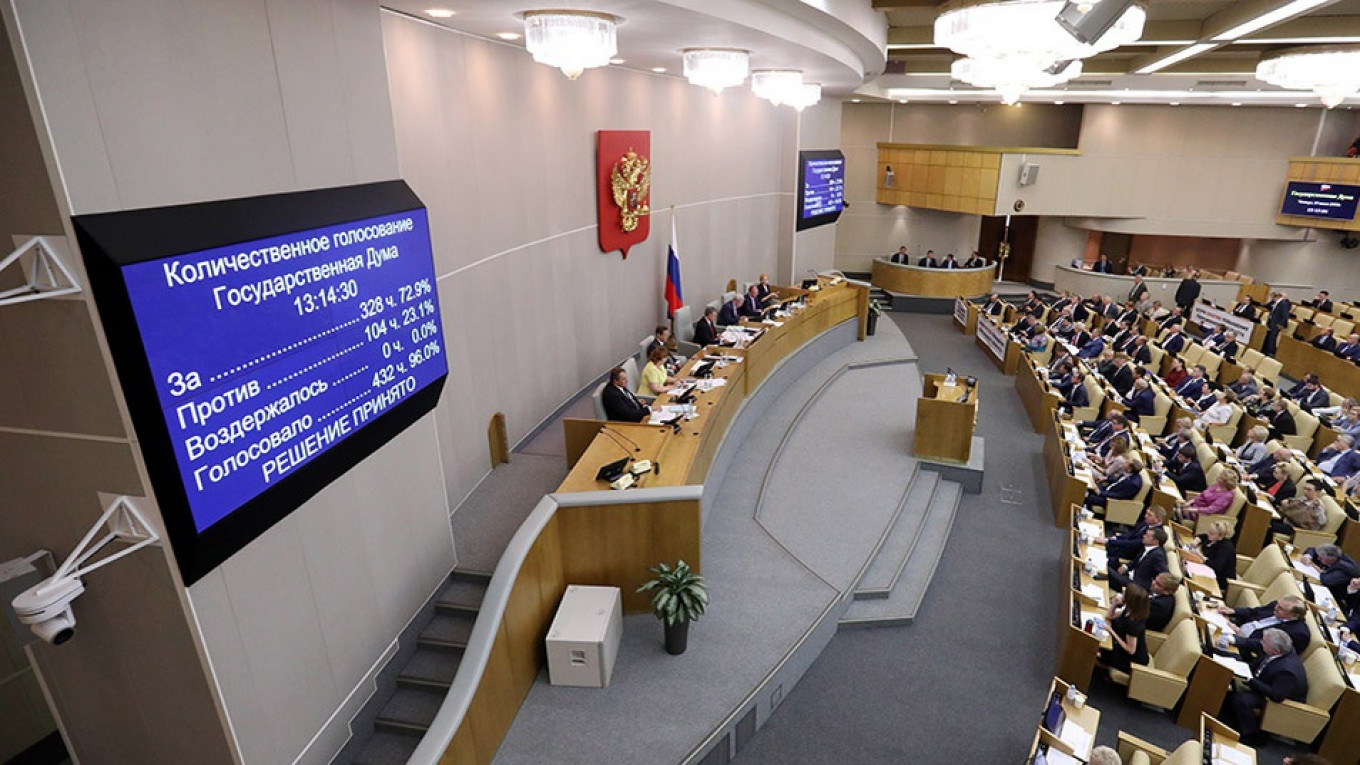The State Duma convened this week to discuss the widely unpopular pension reform bill announced earlier this summer.
Under the proposed bill, the retirement age for men would increase from 60 to 65 years by 2028, and from 55 to 63 by 2034 for women. Opponents of the proposal have argued that many Russians, especially men, might not live to retirement.
Since Prime Minister Dmitry Medvedev went public with the proposal on June 15, President Vladimir Putin’s popularity ratings have sharply declined and opponents across the country have spilled into the streets in protest.
Still, in July, the bill passed the first of three readings — a bill needs to pass three readings before it lands on the desk of the president — with 328 lawmakers voting in favor and 104 voting against. (The ruling United Russia party holds 336 of the Duma’s 450 seats.)
The second reading is expected at the end of September or early October. In advance, the Duma is collecting recommendations for amendments to the law.
The Moscow Times asked four prominent political analysts who attended the Duma hearings what to look out for:
Yekaterina Schulmann, independent political analyst
“We heard that there are already 100 proposed amendments to the bill, but this is only the beginning. It’s still summer. The Duma is on summer break and so are regional legislators. Starting Sept. 3 we’ll see a lot more recommendations.
“The [ruling] United Russia party on Monday published a list of recommended amendments on its website. The list is important because United Russia can, essentially, change the bill in whichever way they want.
“Everyone seems to believe for whatever reason that Putin will make an announcement Aug. 28, and of course everyone would like for the president to take some political responsibility for this reform.
“I got the feeling that the cabinet and to some extent the presidential administration was unhappy with the Duma for even organizing [these hearings]. On Sept. 9, there will be regional elections across the country. Why remind people before the vote?"
Abbas Gallyamov, former Kremlin speechwriter
“The hearings showed that those who back the bill can use logic and reason to explain all its macroeconomic necessities. But will that be enough to convince society? It's not clear. Right now, society is operating on an emotional plane; it is deaf to rational argument.
“Essentially, people feel lied to. The presidential campaign just finished [in March] and people were promised this beautiful and great future. They went out and voted for Putin and suddenly they hear an announcement that money is going to be taken from their pockets.
“The administration is also clearly trying to avoid taking responsibility and did not have much of a presence in the hearings. We didn’t see the prime minister, or the deputy prime minister. Instead, they sent Maxim Topilin, the Labor Minister. He has a low profile and couldn’t answer half the questions since he doesn’t deal with the budget.
“It’s clear that what Medvedev wants is to maneuver himself out of taking responsibility for this reform. And I’m not sure Putin will like this. Putin expects people to do what they are told. So this whole situation seems like a lose-lose for Medvedev.”
Yevgeny Minchenko, president of Minchenko Consulting
“Even many of the reforms’ critics who spoke out said that the reform itself was important. The fight seems to be more about the parameters of the reform: by how much to raise the age and how to support the people who will be negatively affected by the reforms.
“I think that the law will be passed and that the main job for the government going forward will be to convince society that enough steps are being taken to respond to people’s concerns. So the main battle now is over how all of this is interpreted."
Mikhail Vinogradov, head of the St. Petersburg Politics Foundation
“These Duma hearings are mostly a way for different influencers to indicate to the president what role they could play in pushing through the reform, and not a way to influence the bill’s actual content. Overall, everybody has made way for the president to make announcements for any changes to the bill, if such decisions are taken.”
A Message from The Moscow Times:
Dear readers,
We are facing unprecedented challenges. Russia's Prosecutor General's Office has designated The Moscow Times as an "undesirable" organization, criminalizing our work and putting our staff at risk of prosecution. This follows our earlier unjust labeling as a "foreign agent."
These actions are direct attempts to silence independent journalism in Russia. The authorities claim our work "discredits the decisions of the Russian leadership." We see things differently: we strive to provide accurate, unbiased reporting on Russia.
We, the journalists of The Moscow Times, refuse to be silenced. But to continue our work, we need your help.
Your support, no matter how small, makes a world of difference. If you can, please support us monthly starting from just $2. It's quick to set up, and every contribution makes a significant impact.
By supporting The Moscow Times, you're defending open, independent journalism in the face of repression. Thank you for standing with us.
Remind me later.







